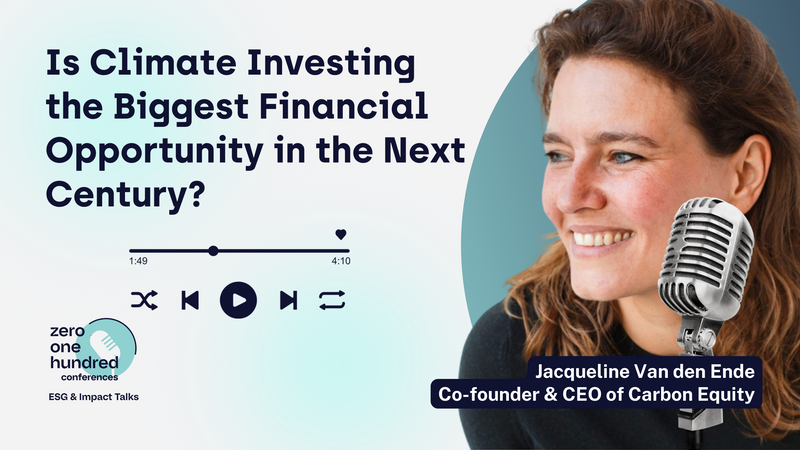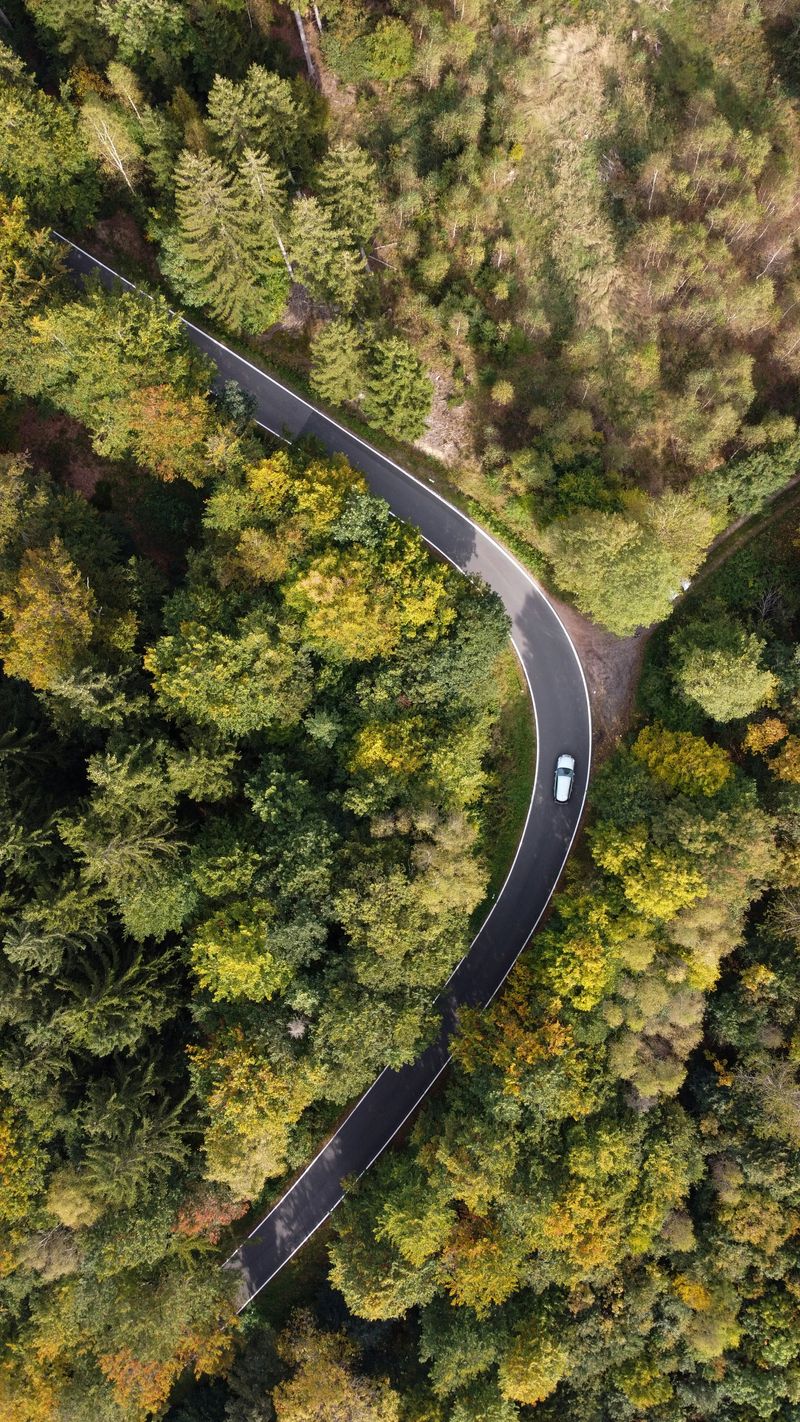Is climate investing the biggest financial investment opportunity in the next century? We had the chance to ask this question to Jacqueline Van den Ende, Co-founder & CEO of Carbon Equity, the “it” climate fund investing platform that this month closed a round of €100 million for climate solutions through its Climate Tech Portfolio Fund II, surpassing its initial target of €75 million.
In this episode of Zero One Hundred ESG & Impact Talks, recorded prior to the company's recent fundraising success, Jacqueline Van den Ende, Co-founder & CEO of Carbon Equity, provides compelling insights confirming climate investing as the paramount financial opportunity of the next century.
Listen to the full conversation here.

Can you please explain to us very briefly how Carbon Equity works and what makes it so innovative from the funds of funds perspective?
Sure. Carbon equity makes it possible for private individuals to invest in breakthrough climate technology solutions. These technological solutions are anything from carbon-free cement, electrification of steel, electric airplanes, plant-based food, grids, and scale batteries. So basically, any kind of solution that we need to move from a fossil addicted to a fossil-free future. And with carbon equity, you invest in not directly into the companies, but in funds. As a result of which you invest in 150 to 250 companies in one go instead of a single investment in a single company. So that makes it rather unique. Typically, private investors have no access to private markets. If you want to invest in private markets, occasionally you can do an angel investment. But when you do an angel investment, that's super high risk because you're investing in a single company. So professional investors typically invest in venture capital or private equity funds because you then have professional investors who do the work for you, and you diversify your risk. But these venture capital and private equity funds are not available for private investors because typically you need five or €10 million even to invest in a single fund.
What Carbon Equity does, is we pool a high volume of relatively small investors who now can invest from €100,000 and later this year from €25,000. And because we pull all of these investors together, we provide unique access to these funds that normally they would not have. So that's what makes it rather unique.
This is a democratization of VC and private equity investing?
Correct.
And when we talk about that, how far can we go nowadays? Because that's what you were saying. Besides angel investors' family offices, what new profiles have you been able to reach with this new model of funding capital?
Our investors are typically on the high end, indeed, family offices or foundations or ultra-high net worth individuals. But on the private investor side, we work a lot with entrepreneurs, with people who are in senior management positions in companies. Typically, people who have some capital that they can invest in high-risk assets. Because you're investing in the private markets, it's typically a riskier investment than if you're investing in liquid markets. People who can take some risk with their capital. So that is the type of profile. And in June, we will launch our first retail fund, which will have minimum access initially of €25,000 and maybe later from €10,000. And then the goal is to be available basically for professionals. People are 30 years and up who have a good job and who care about investing for the future. So, people who are investing maybe for their pension, or we have people who invest for a children's savings plan, for example, and who seek to invest to make a financial return, but also to have an impact with your capital, because you're investing in actual climate solutions that can help solve climate change.
Where do you think you will be able to find these people? Not for these new retail tickets here in Europe. You're going outside of Europe. What's the plan?
Yeah, good question. We started in the Netherlands and Belgium, and we also have investors from Germany and the Nordics. Our initial plan is to focus on Europe in the next two years. And eventually, we might also launch carbon equity in the United States and in Asia, basically because that's also a big capital market. But the initial focus is on Europe.
And then in which parts of Asia would you like to launch? Because you have experience in the Asian market
Yeah, correct. I lived for six years in the Philippines, but the main market in Asia would be Singapore, which is the main hub for fintech and financial services and wealth management.
And from your LP perspective, since you are always looking for this climate, VC and private equity firms to invest in. How is the landscape doing nowadays?
The landscape of venture capital growth and buyout funds that are focusing exclusively on climate solutions is growing very rapidly, even within the three years that we have been active in the market, we've seen the market expand massively, especially on the growth side. In general, there are more venture capital and early-stage funds than late-stage funds. But we see the number of later-stage funds growing rapidly. What's also very interesting is that the big incumbent asset managers are also, that were traditionally not focused on climate, are now all starting to launch climate strategies. KKR has an impact fund, Wellington has a big climate fund. So, the more traditional players are also starting to enter the space, which I think is a big vote of confidence that climate investment is now really an investable theme. Before maybe it was a bit of a niche theme, but now it's really becoming a core strategy because people are starting to realize that climate solutions are not sort of an impact niche, but are nothing less than the fourth industrial revolution.
It's a huge transformation of the economy and investors want to be part of that. So yeah, seeing very positive signs on the investment side.

And how do you select the best climate funds? Because in the end what you do is facilitate private investors to be able to invest in the best funds. So how do you select them, how do you do this screening and where do you find this fund?
We are specialized in climate diligence. We have a team of alumni on one hand from the institutional fund of fund investing side. We have a lot of alumni from Alpinvest, which is the fund of funds investing arm of The Carlyle Group. On the other hand, we have people who primarily come from McKinsey and specialize in the energy transition side. They have together developed a climate diligence framework where we assess the quality of climate impact that a fund can realize. And we do that actually in two stages. Step one in our climate diligence process is to look at the process and the governance side of impact. So, we look at what is the intentionality, the impact intention of a fund, and then we look at how or to what extent is a fund able to execute upon that intention. So, we assess the quality of the team, who is responsible for impact, their selection process, and how they define how much impact is enough. So how do they set impact thresholds? Who decides on impact, how do they measure impact, but also to what extent are incentives, so carry incentives in the fund, for example, tied to the ability to impact.
We look at team processes, governance, and incentives to make sure that a fund not only has this intention but will and is able to execute upon that intention. The second part of our scan or our impact diligence is focused on impact track record. And there we assess to what extent the previous investments that a fund has done and the current investments that are in the pipeline, to what extent these are critical net-zero technologies. We have identified what the critical net-zero technologies are. What are the key technologies that we need to be Paris-aligned to get to net zero? We review to what extent these technologies fit that framework to make sure that a fund, by and large, invests exclusively in critical net-zero technologies and is therefore fully Paris-aligned. So those are the two elements of our impact diligence. And then the third step is only after, so we score funds on a scale of one to five, where five is global best practice and the fund needs to score at least a three out of five to progress in our diligence process. And then the final step of the diligence process is general and financial due diligence, where we assess the financial track record of a fund and also assess its ability to deliver market rates or above-market rate financial returns.
So those are the two elements of the diligence process.
Do you have any specific requirements when it comes to SFDR, any article that you request their fund to have?
Yes. We do not exclusively invest in SFDR nine funds. The reason is that US funds do not have the SFDR framework. So it happens that we invest in US funds that are not qualified as SFDR article nine, but in practice are at least at an SFDR nine level or above. A second reason why a fund might not be SFDR nine could be for early-stage funds. Seed funds that are in an early stage of development may not yet meet the compliance requirements of being SFDR nine but meet all of our standards in terms of investing in critical net-zero technologies and having the right policies and governance in place to meet our criteria. To date, all of the European funds that we've invested in were, in fact, Article Nine funds. But there is a possibility that there are exceptions to that.

When it comes to getting funding and looking for private investors, you are focused nowadays on Europe, right? And then in the future, you are expecting to expand to the US and Asia. And when it comes to investing in funds, how's your focus? Where do you most invest in?
Primarily in Europe and the US. The US landscape is bigger than the European landscape, both for early and later-stage funds. In our most recent fund of funds, it would be maybe 55% US and 45% Europe. We are open to reviewing funds in other geographies, so we can also look at funds in Asia, but we do think step by step. We started with a focus on Europe and the US, and the larger we go, the more we will broaden our focus to other geographies and potentially also emerging markets at some point.
And when you say emerging markets, you mentioned Asia first and Latin America. This is a personal question.
Yes, we can. We already have a couple of people who were interested in investing from LATAM, specifically from Mexico. And LATAM is obviously a huge, massively important region in terms of climate change. So yes, I mean, LATAM will be an important region, but I see that only happening in three to five years. So as a startup scale-up company ourselves, we need to do things step by step.
You mentioned before, that you have private equity buyout, and you have VC funds, and both are growing very well. But how do you balance this portfolio?
That's where the value of a fund of funds comes in, allowing you to diversify risks. We try to diversify across three dimensions: early-stage, late-stage, and climate themes. Our most recent fund of funds had approximately 10% in seed, 50% in series A/B, 30% in growth and buyout, and 10% in co-investments. We also diversify geographically, with about 50% in Europe and 50% in the US. And we ensure diversification across six key climate themes: agro-food, mobility, energy, the built environment and industry, and carbon capture and storage.

Have you seen more innovation in some specific areas in Europe or some specific countries, or in general, do they develop evenly in Europe and the US?
There are areas where you see much more innovation than in others. Two relatively underfunded areas are the built environment and heavy industry. Mobility, agro-food, and energy see more investments. Funds like Astanor focus solely on the agro-food vertical, while 2150 focuses purely on the built environment sector. Carbon Equity invests in both generalist climate funds and sector specialists to improve exposure to certain themes.
Have you been investing always in the same funds in the last three years? Do you have any policy when it comes to alternation?
Every year, Carbon Equity launches a climate tech venture capital and private equity vintage year fund. We have a fund-of-funds strategy, which invests in seven to ten different climate funds annually. We may invest in the same fund multiple times. For example, Energy Impact Partners. We monitor approximately 450 climate funds and select seven to ten per year based on the best opportunities.
Okay, perfect. So, you alternate, and you have these new funds of funds every year?
Yeah, definitely. In the most recent fund of funds, we have invested in many different managers like At One Ventures, which is a US-based manager. We've invested in Extantia, Contrarian Ventures, and many other managers that are yet to be disclosed. So, we have a different set of managers in every fund of funds.
And how is the relationship with them? Because, for example, when you think about VCs specifically and the relationships they have with their portfolio companies, their relationship has to be very close. And when it comes to a fund of funds, how do you manage your fund managers?
Yeah, that's a good question. It's different from... Indeed, with a direct fund, we particularly engage with the fund managers in the whole diligence phase. When we decide whether or not to invest in a fund, we maintain a regular reporting relationship. We also do an annual review of the impact scorecard, the climate impact scorecard, to ensure that a fund is on track to meet the impact standards that we have set. So we have regular contact with the funds, but we, for example, do not sit on, we don't involve ourselves with their investment decisions. Ultimately, we make a call on whether is this a top climate investment fund. Do we trust them to make the right decisions, so we don't get involved in the investment process after we have decided to commit as an LP?

My last question. Why do you consider climate investing the biggest financial investment opportunity in the next century? Because there are other spaces where we can invest as well, right? For example, I was listening to this afternoon to an interview with a person who does a lot of tech for Defense, not only cybersecurity but also for safety. So when it comes to climate investing, why?
Yeah, that's a great question. There are multiple investment themes. Artificial intelligence would be a huge theme, and software remains a big theme, as well as healthcare and cybersecurity. The difference with climate investing is that it touches literally every aspect of the economy. So fossil fuel—everything that we do is fossil-based. The polyester clothing that you're wearing, the muesli that you ate this morning for breakfast, is ultimately made with fertilizer made from fossil fuels. Maybe you got in a car or stepped onto your bike made of steel made with fossil fuels. So fossil fuels are the core energy based on which all of our wealth, the entire global economy, is built on top of fossil-powered energy. And so, the challenge to replace fossil with renewable and clean energy and to cut fossil out of every possible supply chain process in a record period is nothing less than the fourth industrial revolution. That is a massive, massive, massive endeavor. The interesting thing about climate investing is also that it is one-directional. So, there is no future possible, no livable future possible in which we rely more on fossil fuels than we do today because climate change will ultimately catch up with us sooner than later.
And so, the fact that the future is so clear that we need to get there makes every government focus on building their green industries. We are seeing sort of a regulatory race to the top and geopolitical competition to attract and build green industries. The American Inflation Reduction Act is a great example of that, as it's one of the biggest stimulus packages to build an America-first green industry. And Europe is trying to retaliate with the European Green Deal. So there's massive government support for this transition. Companies are realizing that they need to go through this transition and are massively investing in solutions. And consumers also prefer greener and cleaner alternatives to traditional alternatives. So that means that both from a government perspective, a corporate perspective, and a consumer perspective, there's a huge demand for clean solutions. And that makes for double-digit growth markets across every niche of climate solution. So, if you look at the forecast, for example, for meat replacements, that market is expected to grow from 29 billion to 235 billion, which is an eight times growth. The market for green building materials is expected to double in the coming ten years. We see massive growth across every single sector of basically climate solutions. And that makes it a very interesting investment theme. Also from a financial perspective, and not only from an impact perspective.
You convinced me, I think it's the biggest financial investment opportunity for the next century.
Honestly, there's nothing bigger than this. It's non-optional, it's one-directional, and it's huge.
But do you think in the future, as you're tackling this, which is okay, let's say the biggest financial investment opportunity, do you think in the future then you can also think maybe of other spaces where you can replicate this model? Because in the end, this is a model that you're using for climate investing, but it can be used for other stuff as well, right?
Yeah. For me, the foundational philosophy of Carbon Equity is money as a means to help solve global challenges versus money purely as a goal in itself. And I think we're going through a transformation of our perspective on money. Previously, we primarily thought of money purely as a goal in itself. So it was about making a lot of money, about buying a bigger and bigger house, about buying a flashy car, and money was purely seen as a utility. And now we're starting to realize that money can have an impact and that money can help solve the big challenges of these times. And for me, that's where I personally get passionate about money. That money as a means to help solve global challenges is so much more interesting than money purely as a goal in itself. For me, an endgame vision of Carbon Equity could be to become the global go-to impact private equity platform where people can help solve real problems that we have with their money. And that could be beyond climate change. So that could be biodiversity and circularity or health and education. So that would be a future dream, perhaps, to expand the types of problems that you can help solve with your capital.
I think that's awesome, and I think you're going to get there because, as you said, we have real problems right now, and I know that we have to go one step at a time. Today's topic is climate investing, but probably in a few years or less, we will be here talking about the other problems that you will be tackling through this model. In the end, as you said, democratizing access to private investing, which is something that many people like to save, but also likes to maybe help and participate in doing good, probably will really appreciate it.
People who just want to make financial returns, because we believe that solving the biggest challenges also is the biggest driver of value creation, both impact and financial value creation. So impact and returns go hand in hand in our point of view.





